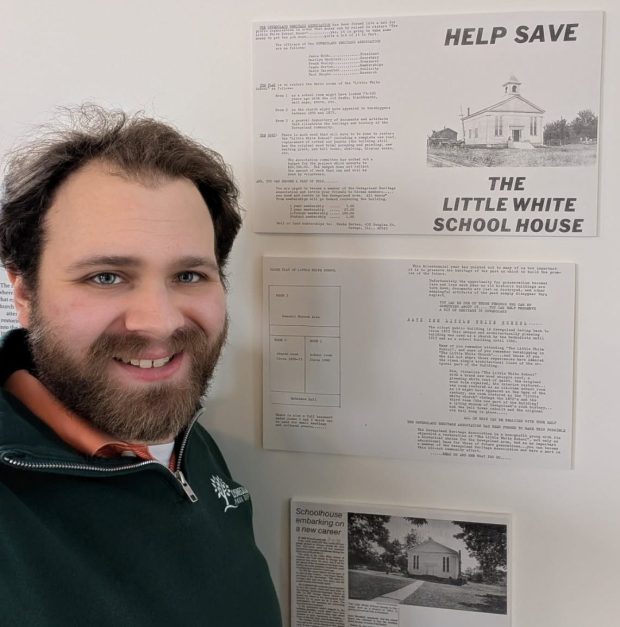The Little White School, one of the oldest structures in Kendall County, is celebrating its 175th anniversary this year with a special exhibit marking the occasion.
Visitors to the museum in the iconic building at 72 Polk St. in Oswego – one that stood neglected for years before the beginning of a resurrection effort launched in 1976 – can view the history of the structure from its inception to the present.
A press release from the museum said that “the exhibit explores the building’s journey to becoming the Little White School Museum, from its earliest days as a Methodist-Episcopal Church, to its half-century as a beloved school building, to the 25-year restoration project by hundreds of community volunteers, local business donations and financial support from the Oswegoland Park District, all coordinated by the non-profit Oswegoland Heritage Association.”
Museum Coordinator Joe Noce came on board last September and said he has been working on the exhibit during the past several months.
Noce said the restoration effort of the building which began in the mid-1970s changed everything.
“When the restoration began, that was kind of the lowest of the low point. For a building that was a church and then followed by a school and always having some community usage and then becoming just a storage building for 10 to 15 years, that was the low point,” Noce said. “But the truth is, I think that was an important moment because it led to its deterioration and the idea that the school board was going to sell it, that spurred this grassroots movement, which is why we have this museum today.”
Visitors who come to the exhibit “will see a number of cool things,” Noce said.
“My personal favorite thing is we’ve got a bunch of documents from the Heritage Association they drew up during its earliest days that kind of display how far it has come,” he said. “We’ve got pins and pamphlets that say ‘Save our school’ and things like that. We’ve got a lot of documents from Museum Director Roger Matile and his peers. Roger still works here on a weekly basis but we’ve got documents from him dating back like, 50 years ago, and to see how his approaches have grown is really cool.”
Noce said another highlight “that I really love” is that the building has some glass dating back to the early 1900s.
“I think the glass is really cool to look at … and how they restored it,” he said.
“The exhibit is up in that main room and you can see the glass they made in the 1990s versus what it looked like in 1901,” he said. “I love how the exhibit tells a story about people who never gave up. Roger is very open and he says, ‘If we knew this was going to take 25 years to do, to restore it, maybe we wouldn’t have been into it, but we did it’ and it’s still here.”
Regarding the rest of the exhibit, Noce said there are “a lot of panels derived from documents over the years.”
“We’ve got original newsletters that we’ve mounted and calls to action in the community and boards that kind of take you through step-by-step the life of the Little White School Museum,” he said. “We’re going to start as a church and go all the way through restoration until today so you can see era by era and using documents from those eras to make it seem more real.”
Boce said his work on the exhibit took about 2½ months but that it wouldn’t have been possible if the Heritage Association “had not been keeping close records since 1976.”
While researching, Boce noted a few discoveries including one that was uncovered while the building was being restored.
“There was a big debate as to whether they restore the building as a school or a church – a lot of the Heritage (Association) members in the ’70s had gone to the school, so they were kind of inclined to restore it as such,” he said. “There was a big argument for the church and what was really cool was to see how they came to the decision to restore it and put aside personal things and their nostalgia in the effort of historic preservation. The arguments, as I understand it, were heated, but I think it’s a really cool thing. It made me happy to see that people could come together and make that decision and commit to something like that.”
The special exhibit at the museum runs through the end of May.
Museum hours are 2 to 6:30 p.m. on Thursdays and Fridays, 9 a.m. to 2 p.m., Saturdays and Sundays, and 4 to 9 p.m. Mondays. Admission is free. For more information, call 630-554-2999, email info@littlewhiteschoolmuseum.org or go to the museum’s website at www.littlewhiteschoolmuseum.org.
David Sharos is a freelance reporter for The Beacon-News.




